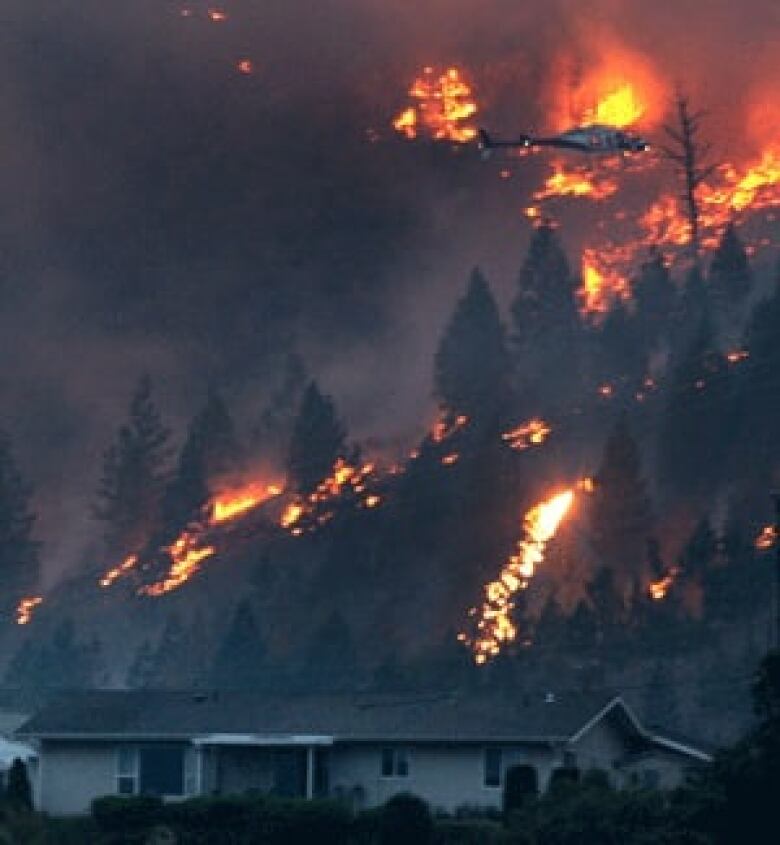Adapt to extreme weather or pay price, expert warns
Co-author of IPCC report Gordon McBean outlines global trends, risks

The Intergovernmental Panel on Climate Change(IPCC) released areportFridayexamining the risks posed by extreme weather events, which the panel saysare becoming increasingly frequent around the world. We talked to one of the report's co-ordinating lead authors about what general trends he and his colleagues found and how these trends might impact Canada.
P.O.V.
Are you concerned about extreme weather events?Have your say.
Gordon McBean is a professor of geography and political science at the University of Western Ontario in London, Ont., and thedirector of policy studies at the Institute for Catastrophic Loss Reduction. He is alsochair of the Canadian Foundation for Climate and Atmospheric Studies and president-elect of the International Council for Science.
Extreme events
Definitions of what constitutes an extreme weather eventvary,but for the purposes of the IPCC, the definitionis based directly on measurements of things like temperature, wind velocity, precipitation levels andstorm surge heights and where those measurements fall in a given region's weather distribution pattern.

Generally, a weather event is considered extreme if it is as rare or rarer than the 10th or 90th percentile. For example, if the rainfall distribution for a given city is that only one in 10 rainfall events produce 90 mm or more of rain perday, then an extreme rainfall event would be any that produced 90 mm or more of rain.
Certain industries, however, have their own definitions.
"Other people in the disaster risk-reduction community would define an extreme event as one that, say, causes more than $1 million in damages," McBean said.
What other studies have said
A Princeton University study published in the Journal of Climate in October suggested periods of sunshine and rainfall have become more volatile: erratic patterns of sun and rain have increased 25 per cent in 25 years.
Lead author David Medvigy said the erratic weather will even affect the air we breathe. "Because of these shifts in sunshine and rainfall, plants will have different rates of photosynthesis," he said. "They'll take carbon dioxide out of the atmosphere at a different rate."
Changing the amount of carbon dioxide could lead to more greenhouse gas in the atmosphere and other effects on climate, the study says.
In a report released Sept. 29, the National Round Table on the Environment and the Economy looked at the impact of climate change on Canada's prosperity, public health and coastal areas.
The government-funded think-tank estimates the cost of climate change could start at roughly $5 billion per year in 2020 and increase to between $21 billion and $43 billion per year by 2050.
The average annual cost of climate change is expected to be roughly 0.8 per cent to 1.0 per cent of GDP by 2050, the report says.
It also found that climate change could result in additional deaths from heat and air pollution. Looking at Vancouver, Calgary, Toronto and Montreal, the report projects three to six deaths per 100,000 people per year in the 2020s, with impacts worsening in future decades.
The report recommends the government invest in research into the economics of climate change effects and adaptation; model and cost out climate impacts; and work with universities and the private sectoron strategies foradapting to climate change.
Environment Minister Peter Kent says the government has already set aside money for adaptation, including $58 million in the last budget.
Global trends
Globally, 75 per cent of disasters are climate-related. That means they are caused byweather events such asfloods, storms, droughts orsnow avalanches as opposed to earthquakes or volcanoes, which are generally not climate-related.
The frequency ofclimate-related disasters seems to be increasing, and the number of deaths they cause is also going up although that could be in part because there aremore people than in the past clustered in large urban conglomerations and along coastal zonesand river deltas so when a disaster does strike, more are impacted.
McBean concedes that dataon disasters for many regions of the world is weak but says that where it does exist, it shows a clear trend.
"Where we have good data on the observations of the climate, you can show that there is an increased frequency of high-precipitation events even in areas where the amount of rainfall isgetting less per year for reasons of climate change," McBean said.
"There's more of these heavy rain events, [and]analysis done by scientists shows that that change is related directly to the greenhouse gasincreasing concentrations. In other words, it's a part of the human-caused climate change."
Canadian weather changes
The number of veryhot days inCanadian summers is increasing at the same time asthe number of extremely cold winter days is decreasing, theIPCC scientists found.
"Canada, on average, is getting warmer. We're also seeing more heavy-precipitation events mostly in the summertimeintense rainfall events, and these are having economic and social impacts on Canadians as individuals and on our society overall."
Economic impacts
The changing patterns of severe weather events have a multitude of environmental and socioeconomic impacts from small power outages that bring our workday to a halt to raging wildfires that destroy entire communities. The insurance industry is one sector that has been raising the alarm about the financial impacts of changing weather patterns.
"The insurance companies are saying it used to be that the biggest concern they had for a homeowner insurance policy was a fire caused by a malfunction or something within the house, or a burglary," McBean said. "Their biggest costs now are wind/rain-induced events."
One such event was the August 2005rainstormin Toronto that washed out a major road and caused millions of dollars in damages.
"The water that came from that rain event over ground, in through sewer systems, directly in through windows, in through the roofs of homes resulted in insurance companies paying out over $500 million," McBean said. "That's the biggest loss in Ontario's historyone rain event in 2005."
And lest anyone think that is the insurance industry's problem, McBean warns that those costs are eventually passed on to allof usthrough higher premiums.
Projections
If the concentration of greenhouse gases in the atmospherecontinues to increase as it has been doing, McBean says we can expect to see much less precipitation in the southern Prairies and southern interior of British Columbia. In the summertime, those regions will warm more than other parts of Canada, posing challenges for the local water supply.

"We're really concerned about increasing drought-like conditions in those areas," McBean said. "That whole trend is even more prevalent south of the border. So, the western part of the United States the Californias, the Utahs, the Nevadas,up towards the border is going to be increasingly drier in terms of a lot more heat, which means evaporating water, and a lot less precipitation, which means not much coming down. So, where's the water going to come from? That's a concern overall."
Canadians in the North can also expect to see further reduction of Arctic sea ice, McBean said.
What now?
McBean says that what Canadians should take away from the IPCC report is a realization that we need to work harder not just to reduce greenhouse gas emissions so that the kinds of trends identified in the report don't get worse but to begin adapting our infrastructure so that it is better able to withstand theimpacts of severe weather events by redesigning building codes, for example.
"Canadians should take this report, and they should individually and collectively, through their government,... take action to reduce our vulnerability," McBean said.












_(720p).jpg)


 OFFICIAL HD MUSIC VIDEO.jpg)
.jpg)



























































































